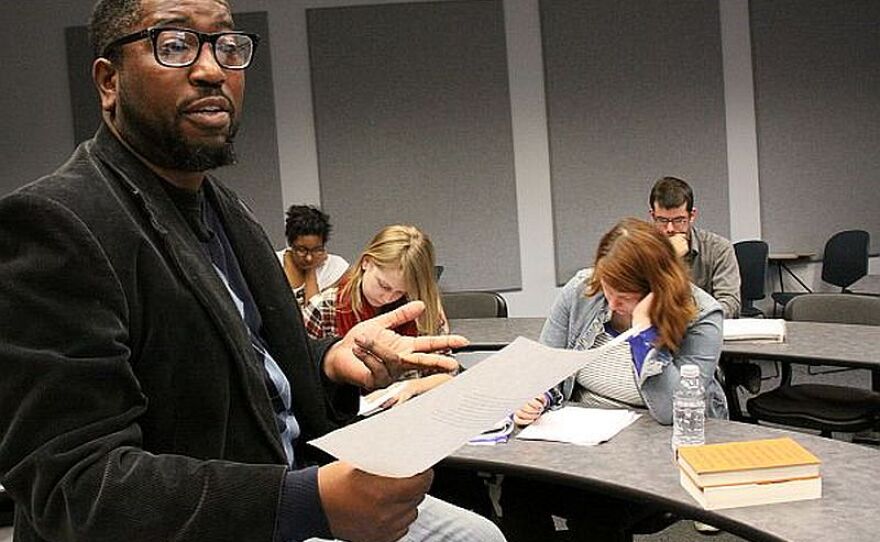In our hyper-connected world, some may find that it’s increasingly difficult to slow down long enough to read and truly enjoy a poem. A professor at the University of Vermont is encouraging his students to appreciate the sound and feel of poems.
Major Jackson says at an early age he fell in love with condensed language as a reader of poetry. His working-class African-American grandparents kept books filled with poems in their northern Philadelphia home. From time to time, Jackson would come across a poem that resonated with him sonically.
“That never left me,” Jackson, 44, said sitting in his office on the Burlington campus. “I still take pleasure in words.”
It was the 1980s, the golden age of hip-hop – a time, Jackson said, when he didn’t find it difficult to go from Robert Frost to bands like the Treacherous Three; a time when reading and writing poetry among black people, Jackson admitted, was widely seen as acting ‘white.’
“Not in my household,” Jackson explained. “If anything, literacy was a means of keeping your eyes on the prize. It was simply realizing that what connected American culture – whether it was a poem in a book or a rap in the street – was language.”
Jackson’s life has taken him from Philadelphia, where he studied business at Temple University, to Burlington, where today he teaches poetry at UVM.
A former accountant, he’s now the poetry editor of the Harvard Review. This spring, he won a Guggenheim Fellowship for his work. He fits a certain academic typecast, with thick-framed glasses, coffee-stained jeans and a corduroy jacket. But it’s clear any stuffy stereotypes end there as he sits on the corner of a desk and commands his class.
“Who’s winning?” he asked his students at the beginning of a recent class.
“We are,” they responded.
In these workshops, Jackson tries to help students lose their inhibition. In this age of digital solitude, he wants his students to appreciate the sound of words, urging them to overcome their anxiety about reading their poems to their peers.
“I think that our generation takes poetry for granted,” said Mari Stokes, a junior from Manhattan, who says she enjoys writing poems, but she arrived in this class uptight about sharing them.
“I read my poems to my mom and my best friend before I submit them. And I’m cool, but then I come in here and I’m like, ‘Ah, words!’ So, we’re working on it,” Stokes said. “I’m naturally really shy and I’m kind of scared that someone might not necessarily like it like I do.”
Major Jackson says Stokes and other students have come a long way since the beginning of the semester.
Throughout the class his style is conversational, calling his students ‘friends’ and telling them that from day one they already had his admiration because, he says, it takes a lot of courage to be expressive in today’s society.
“We are not encouraged to be thoughtful with language and to think about the implications and the effects of the language that we use,” Jackson said. “I can’t think of any group in our society that needs that more than the young people today.”
Jackson says a poem isn’t a billboard for some sort of emotion or hallmark, so when students are caught up in the vortex of campus life the opportunity to write a poem is an invitation to slow down.
He says there’s not much in their day-to-day, rigid routines that welcomes that kind of deep reflection.
Galway Kinnell
Poet Galway Kinnell has won both a National Book Award and a Pulitzer Prize for his work. Now, he spends much of his time in the “front room” of a quintessential red Vermont farm house, where he lives with his family.
What does poetry bring him?
“If it’s a poem I love, it brings me great happiness. Poetry has a strange timber that prose doesn’t have. In prose we tell what happened, in poetry another voice takes over strange to us perhaps where our tenderest and truest words are spoken. Apart from my loved ones, poetry has been the most important thing in my life,” he said.
Galway Kinnell’s poem “St. Francis and the Sow,” is included in Poetry 180.
St. Francis and the Sow
The bud
stands for all things,
even those things that don’t flower,
for everything flowers, from within, of self-blessing;
though sometimes it is necessary
to reteach a thing its loveliness,
to put a hand on its brow
of the flower
and retell it in words and in touch
it is lovely
until it flowers again from within, of self-blessing;
as St. Francis
put his hand on the creased forehead
of the sow, and told her in words and in touch
blessings of earth on the sow, and the sow
began remembering all down her thick length,
from the earthen snout all the way
through the fodder and slops to the spiritual curl of
the tail,
from the hard spininess spiked out from the spine
down through the great broken heart
to the blue milken dreaminess spurting and shuddering
from the fourteen teats into the fourteen mouths sucking
and blowing beneath them:
the long, perfect loveliness of sow.








